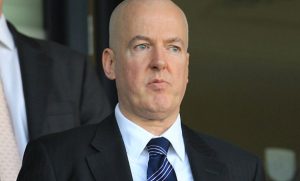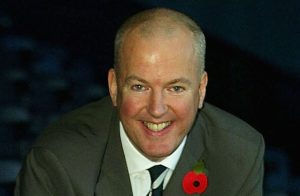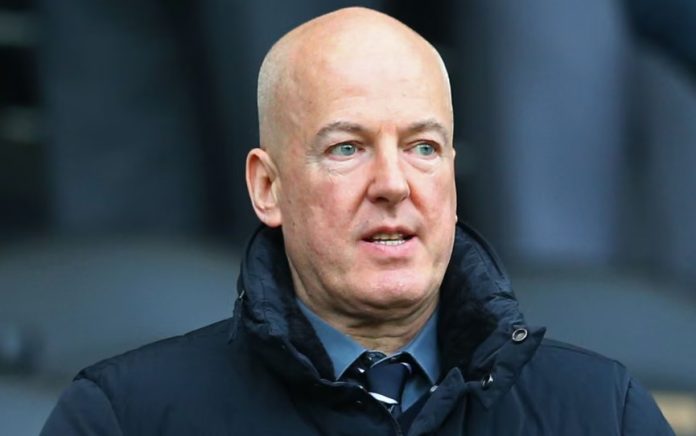Table of Contents
Jeremy Peace, former chairman of West Bromwich Albion, is a well-known figure in both football and finance. With a background in investment and corporate leadership, his approach to wealth creation has been cautious yet highly effective.
In 2025, his net worth remains a topic of interest for many, particularly following the profitable sale of the football club.
This article explores Jeremy Peace’s estimated net worth, key assets, investment strategies, and the financial decisions behind his sustained success.
Who is Jeremy Peace and What is His Background?

Image – Source
Early Life and Education
Jeremy Roland Peace was born on 13 August 1956 in West Bromwich, England. He received his education at Shrewsbury School, a prestigious independent school in the UK, which laid the foundation for his future in finance and business.
Professional Career Before Football
Peace began his career in the financial sector, working in accountancy, stockbroking, and investment banking between 1974 and 1983.
During this period, he developed expertise in corporate finance and investment management.
By the 1990s, he had become a significant shareholder and director in several public companies, including Morland Securities PLC (later renamed Access Satellite International PLC) and Sangers Photographics PLC (later Quadrant Group PLC).
Over the years, he expanded his business interests by holding director or shareholder positions in companies such as South Country Homes, Thomas Potts, London Town, e-primefinancial, EP&F Capital, Galahad Capital, and Camelot Capital.
Involvement with West Bromwich Albion F.C.
Peace joined the board of West Bromwich Albion as a non-executive director on 8 December 2000. In June 2002, he became chairman following the resignation of Paul Thompson.
By 2005, he had taken the club private, gaining majority control and full operational authority.
In 2013, he transferred his 59.9% shareholding into a newly formed entity, West Bromwich Albion Holdings Limited, where he held 100% of the ordinary share capital and served as the sole director. A new class of “A” ordinary shares was created, with Kappa Limited as the sole shareholder in that class.
Leadership Style and Sale of the Club
Peace was known for his no-nonsense approach to club management. Managers were expected to accept the title of “head coach” and work within a defined structure.
In August 2016, he sold West Bromwich Albion to Chinese businessman Guochuan Lai for a reported £150–£200 million, remaining in an advisory role for the 2016–17 Premier League season.
What is Jeremy Peace’s Net Worth in 2025?
As of 2025, Jeremy Peace’s estimated net worth is approximately £175 million. This figure is based on a combination of factors including proceeds from the sale of West Bromwich Albion, business earnings, equity in private ventures, and property assets.
The valuation is based on historical sale data, asset value estimations, and known business activity.
While Peace does not disclose personal finances publicly, analysts and financial commentators frequently reference the club sale and his investment background to assess his current worth.
What Are the Main Assets Owned by Jeremy Peace?

Image – Source
Jeremy Peace’s estimated net worth in 2025, valued around £175 million, is made up of a strategically diversified portfolio of assets.
While Peace is known for maintaining a low public profile, a closer analysis of his financial background and previous dealings reveals several key asset categories that contribute significantly to his personal wealth.
1. Real Estate Holdings
Real estate is a foundational component of wealth for many high-net-worth individuals, and Jeremy Peace is no exception.
Though specific properties are not disclosed publicly, it is widely believed that he owns a number of high-value residential and possibly commercial properties in the United Kingdom. These may include:
- Private residences in affluent areas such as London or the West Midlands
- Buy-to-let properties providing rental income
- Commercial premises used for long-term leasing or investment purposes
Real estate has long been regarded as a stable and appreciating asset class, and Peace’s background in finance suggests a calculated and long-term approach to property acquisition.
2. Equity in Private and Public Companies
Peace’s history in stockbroking and investment likely means that he holds a considerable portion of his wealth in the form of company shares. This may include:
- Stakes in privately held UK businesses, particularly in finance and services
- Holdings in publicly traded companies, diversified across multiple sectors
- Minority ownership in firms with growth potential or stable dividend payouts
He may also be involved in non-disclosed ventures as a silent partner or through holding companies, enabling him to generate capital growth without direct management involvement.
3. Cash Reserves and Fixed-Income Investments
To preserve liquidity and manage risk, Peace likely maintains a significant amount of his wealth in cash equivalents and fixed-income securities. These assets, while not as aggressive in returns as equities, provide financial stability and a reliable income stream. His holdings might include:
- High-interest savings accounts
- Government bonds or corporate bonds
- Money market funds
Given the nature of his business dealings, it is reasonable to assume that his portfolio maintains a healthy cash buffer to enable quick investment decisions or provide stability in uncertain markets.
4. Proceeds from West Bromwich Albion Sale
The single most influential asset in Jeremy Peace’s financial profile is the proceeds from the sale of West Bromwich Albion Football Club.
In 2016, the club was sold for an estimated £175 million to Chinese investor Guochuan Lai. As Peace was the sole or majority shareholder at the time, he would have received a significant portion if not the majority of this sum. The capital received from the sale has likely been:
- Reinvested into diversified financial assets
- Used to acquire real estate or other appreciating assets
- Allocated for long-term wealth preservation and estate planning
The scale of this transaction significantly transformed Peace’s asset portfolio and allowed him to enter new investment arenas with substantial liquidity.
5. Business Interests and Other Ventures
Though Peace has kept his post-football business activities relatively private, it’s believed that he maintains stakes in other ventures that support his wealth growth. These may include:
- Passive investments in small and mid-sized UK firms
- Silent partnerships in property development or finance companies
- Limited involvement in private equity funds or venture capital networks
His business experience gives him the insight to identify profitable ventures without taking on active operational roles, making these investments relatively low-risk and long-term in nature.
Asset Overview Table
| Asset Type | Estimated Value (in £ millions) | Characteristics |
| Residential and Commercial Property | 35 | Located in high-value UK markets, includes income-generating units |
| Company Shares & Business Equity | 45 | Private and public holdings, diversified sectors |
| Cash and Bonds | 20 | Liquidity reserves, low-risk instruments |
| Proceeds from WBA Sale | 50 | Reinvested across asset classes |
| Other Ventures & Investments | 25 | Private equity, partnerships, passive income sources |
| Total Estimated Asset Value | 175 | Aligned with overall net worth in 2025 |
Summary of Asset Profile
Jeremy Peace’s asset composition reflects a balanced approach that values risk mitigation, capital appreciation, and income generation.
His portfolio does not rely heavily on any single sector, which is consistent with strategies employed by experienced investors.
The transformation of his wealth following the WBA sale allowed him to restructure his holdings and focus on sustainable, long-term financial growth.
This structure highlights a common model followed by affluent individuals who seek to grow their wealth privately, without the volatility often associated with high-risk investments or public ventures.
How Did Jeremy Peace Build His Wealth?
Peace’s financial success is primarily attributed to his early work in finance and his later ownership of West Bromwich Albion.
Before his involvement in football, he gained valuable experience in stockbroking, financial management, and corporate leadership.
These roles laid the foundation for his ability to evaluate investment opportunities and manage operational costs effectively.
His tenure at West Bromwich Albion was characterised by financial prudence. While many football club owners operate at a loss or accumulate debt, Peace ran the club profitably. Key financial events that contributed to his net worth include:
- Acquiring majority ownership in West Bromwich Albion during its rise to Premier League status
- Earning increased revenue through broadcast rights and sponsorship deals while in top-flight football
- Selling the club at a significantly appreciated value
What Were His Financial Gains from West Bromwich Albion?

Image – Source
Jeremy Peace’s most public financial transaction was the 2016 sale of West Bromwich Albion to a Chinese consortium led by Guochuan Lai through Yunyi Guokai Sports Development Ltd. According to multiple news reports and financial analyses, the club was sold for around £175 million.
Peace had gradually increased his stake in the club until he owned a controlling interest, making him the primary beneficiary of the sale.
The deal was considered one of the more successful exits among football club owners in the UK at the time.
The value of the club had appreciated under his management due to consistent Premier League appearances, a disciplined wage structure, and minimal debt exposure. These factors significantly increased the sale value.
The following table outlines the key financial highlights of Peace’s ownership period:
| Financial Aspect | Details |
| Ownership Period | 2002 to 2016 |
| Estimated Club Value in 2002 | £5 to £10 million |
| Sale Value in 2016 | Approx. £175 million |
| Club Status During Sale | Premier League club |
| Financial Approach | Conservative, low spending |
| Major Income Sources | TV rights, sponsorship, transfers |
This transaction significantly elevated Jeremy Peace’s financial status, providing the capital for future investments and wealth management.
Where Has Jeremy Peace Invested Post-WBA Ownership?
After exiting the football world, Peace turned his attention to private investment opportunities. His business history indicates a preference for long-term wealth preservation rather than speculative ventures.
While exact details remain undisclosed, financial analysts suggest his investment strategy includes:
- Private equity participation in UK-based firms
- Real estate acquisitions for rental and capital appreciation
- Long-term stock and bond portfolios managed by private financial institutions
These investments are likely structured to ensure capital preservation while generating moderate returns over time. Peace’s low public profile since the sale also suggests that he avoids high-risk or high-visibility ventures.
How Does Jeremy Peace Manage and Grow His Wealth?
Jeremy Peace is not known for flamboyant spending or media presence, and this approach extends to his wealth management.
His financial strategy is likely built around stability and conservative growth. He may work with wealth management firms, although he has the expertise to oversee his own financial decisions if preferred.
Components of his wealth management style likely include:
- Asset diversification across real estate, equity, and fixed income
- Reinvestment of returns into low-volatility funds
- Use of trusts or holding companies for tax efficiency
- Limited involvement in volatile or short-term trading activities
The table below provides a general view of how Peace’s assets may be distributed as of 2025:
| Asset Category | Estimated Allocation | Key Characteristics |
| Real Estate | £35 million | UK-based, residential and commercial |
| Private Investments | £60 million | Equity in mid-sized firms, private funds |
| Stock and Bonds | £30 million | Diversified UK and international markets |
| Proceeds from WBA Sale | £50 million | Retained or reinvested capital |
| Total Estimated Value | £175 million | Approximate net worth in 2025 |
These allocations are speculative but consistent with what is typically expected from a financially conservative high-net-worth individual.
What Can We Learn from Jeremy Peace’s Financial Strategy?

Image – Source
Jeremy Peace’s financial strategy presents a model of disciplined investment and operational prudence.
His journey offers key lessons for investors, business owners, and entrepreneurs looking to build sustainable wealth:
- Patience and timing are crucial in asset acquisition and exits
- Financial success does not require public attention or aggressive risk
- A strong foundation in finance enables smarter long-term decisions
- Diversification and risk management remain key to preserving capital
His ownership of West Bromwich Albion and subsequent exit showed how value can be built through stability and efficient management rather than constant expansion or overspending.
Conclusion
Jeremy Peace’s financial journey reflects disciplined investment, strategic decision-making, and long-term planning.
His estimated £175 million net worth in 2025 showcases how a low-profile yet calculated approach can yield impressive results. From football club ownership to private investments, Peace has consistently prioritised stability and value creation.
His story offers valuable insights for those seeking to grow wealth with foresight and restraint, proving that sustainable success often lies in quietly making the right moves over time.
Frequently Asked Questions About Jeremy Peace’s Net Worth
How accurate are the net worth estimations of Jeremy Peace?
These are based on public records, media reports, and market value assessments. His actual wealth may differ slightly due to private investments.
Did Jeremy Peace make most of his money from football?
While his time at West Brom was lucrative, his wealth originated from broader financial and business investments.
Is Jeremy Peace still involved in football in 2025?
As of 2025, there is no public record of him being involved with any football clubs.
What businesses did Jeremy Peace own besides West Brom?
Peace has held positions and investments in various finance-related firms, though specific names are not always publicly listed.
Where does Jeremy Peace live now?
Though unconfirmed, it’s believed he resides in the UK, possibly in a private estate or investment property.
What was the sale value of West Bromwich Albion?
The club was sold in 2016 for a reported sum of approximately £175 million.
Is Jeremy Peace listed in any UK rich lists?
He hasn’t consistently featured on major rich lists but is recognised as a high-net-worth individual in business circles.
Featured Image – Source


